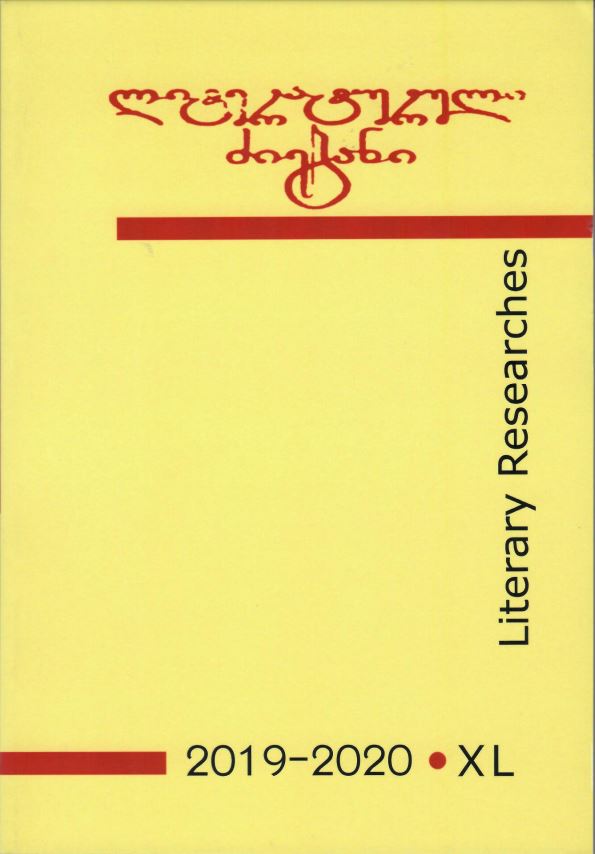სტალინიზმის დეკონსტრუქცია და ანტირუსულ-ანტიკოლონიური დისკურსი გურამ რჩეულიშვილის ნოველაში "სკოლიდან გამოვარდნილი ბავშვები"
გამოქვეყნებული 2020-10-20
საკვანძო სიტყვები
- Stalinizm,
- Anti-Russian Discourse,
- Anti-Colonial Discourse,
- Guram Rcheulishvili
როგორ უნდა ციტირება
ანოტაცია
In the Novella (written in 1956, first published in 1989 in the May 26 issue of “Literary Georgia”) Guram Rcheulishvili deliberately chose an expressionistic style, and it was not merely inspired by the object of reflection - the anti-Soviet demonstrations and rallies of March 1956 or the cinematic style that was quite fashionable at that time. The expressionist style of the novella, as that of the modernist work, implicitly contradicts the dictates of Stalinist totalitarian regime and the dictatorship of the Soviet socialist aesthetics, since it is precisely the aesthetics and outlook of modernism that drives the individual, his/her personality, throws back the principles of mimesis, strives towards formal experiments and direct individual style, by which Modernism contradicts soviet collectivism and dictatorship. That is why the modernist aesthetics and outlook, as an antiSoviet manifestation, were rejected in the Soviet Union; a social-realist war on modernism was declared, and eventually banned by the famous 1932 Communist Party Central Committee decree on the “transformation of literary-artistic organizations.” The Union of Georgian Soviet Writers invited in the same year supported this resolution (Gaprindashvili ... 2010: 44). Interestingly, the Nazis who came to power in Germany in 1933 declared war on modernist and avant-garde art and writing and officially banned it thereafter (Fähnders 2010: 273-274).
Through the selection of an Expressionist style Guram Rcheulishvili, on the one hand, stated that he continued the “discontinued” tradition of Georgian modernism (ca. 1915-1932), on the other hand, emphasized the need to re-actualize this tradition because it was exactly the style that fitted the spiritual needs of Georgian youth in the 1950s. By this G. Rcheulishvili laid the foundation for the so-called new subjectivity in Georgian Prose); and thirdly: This style proved to be the most efficient methods for deconstructing totalitarian ideology and the effective development of anti-Stalinist, anti-Soviet discourse in the text of the novella.
In G. Rcheulishvili’s work the most antisocial, anti-Soviet and anti-colonial discourse can be traced in the Novella Children who dropped out of school dedicated to the famous events of March 9, 1956 and inspired by this tragic event. But the novella, the main thing is not the artistic reflection of the bloodshed caused by the Soviet troops against the Georgians protest (which is given in quite an impressive way), but this event is generalized in the light of the Georgian national tragedy, caused by the 150 years of colonial conditions (given the creation date of the Novella - 1956). It should also be noted that the novella was not created impulsively on during March 9 events, with a strong emotional background (it should be noted that G. Rcheulishvili himself was a participant in these demonstrations), but a few months after these events, autumn of 1956, and thus Rcheulishvili’s novella is not an immediate affair inspired by the demonstration in Tbilisi on March 9, or as a text-reaction to this protest events, but a well thought out text about the colonial way of life and the nature of the Soviet totalitarian system, the anti-human understanding and its artistic expression. However, thorough this particular historical context, in my opinion, more global problems emerge, with Guram Rcheulishvili’s views on anti-historicism and skeptical historicism: namely, the a theological nature of the world historical process experienced by him in the novella (the anti-Hegelian approach) and the question of the no perspectives for the Georgian nation in the novella within the «objective mind» of an unproven historical process. G. Rcheulishvili’s anti-historicism is at the same time anti-Soviet in its nature, as it destroys the basis of so-called Dialectical materialism in understanding the historical process, thereby rejecting the ascending line of history towards the ultimate goal of communism.
Therefore, the author’s genre-based, stylistic, and narrative choices seem quite logical: on the one hand, novella as a genre and a strongly expressed expressionist style (parataxis, phrase sharpness, ellipsis, intensity, and compactness), on the other hand, as well as the expressionistic framing and the technique of montage during narration (so-called cinematic style), which quite adequately conveys the chosen theme and problem.
In the Novella, on the one hand, the author’s anti-Stalinist, anti-colonial and anti-Russian tendency is quite obvious, but on the other hand, what is most important is the ending of the novella in which the peculiar anti-historicism of G. Rcheulishvili can be seen, namely his deeply skeptical and nihilistic attitude towards the teleology of the historical process itself and the objective reasoning of this process: the Russian/Soviet tank versus the Georgian child/ schoolchildren (compare: child – the symbol of life, future, divine nature, paradise being, Metzler… 2008: 180) and generally the slaughter of people (people, who should develop the teleology of historical process and in the end of history should experience ethical bliss within the lawful state, compare. Schiller’s pathetic words towards mankind “hug Millions of people”/“Seid umschlungen Millionen” from his famous verse “Ode to Joy/“An die Freude”), are those iconic markers, which points to the a priori and infinite, ever-recurring dominance of global political power/violence/willpower in the course of the history of rotation (Nietzsche) the recollection of history, which is expressed metaphorically by the Russian/Soviet tank.

